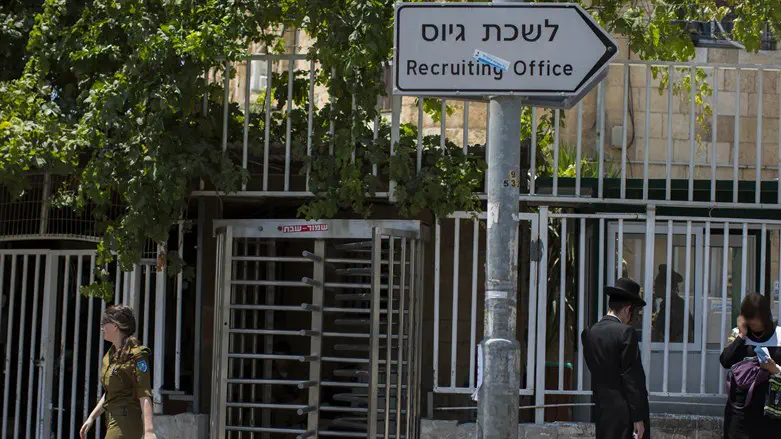
A prominent haredi political commentator, Avi Bloom, has congratulated National Security Minister Itamar Ben-Gvir for refusing to back down in the face of threats and insisting on representing the government at a Memorial Day ceremony. "One cannot exclude half the nation," Bloom said, speaking on Radio Kol Chai.
His admiration for Ben-Gvir's tactics is all the more poignant in light of the haredi Knesset members' failure to advance legislation seen as a priority for their constituents, namely, the Draft Law. As things stand, the current law will expire in several months' time after being granted an extension by the Supreme Court, which has ruled it invalid as it contradicts the Court's conception of equality as embodied in the country's Basic Laws, placed on a pedestal by the Court itself which sees them as having quasi-constitutional status. In the absence of a new draft law, all haredi men of draft age will theoretically be required to enlist for mandatory military service.
Although the Likud, Israel's largest political party, promised the haredi parties to prioritize a new Draft Law when signing coalition agreements with them, the issue has been pushed to a back burner with all focus turning to judicial reform over the past months. Meanwhile, negotiations being conducted under the auspices of the President's Residence continue with no reports of any breakthrough or compromise.
"It's already obvious that Netanyahu isn't going to be passing the reforms this summer, and despite that, they're still trying to bring people out onto the streets in huge numbers. Now the question is what will happen to the Draft Law. We're the ones who are going to take the heat and they're going to base a campaign around this issue next time around," Bloom said, referring to opposition parties. "They're going to play the haredi card, yet again. And as for Bibi, he's afraid of all the protests so he's giving up on the judicial reforms and he's going to try to avoid passing a Draft Law as well. But the Supreme Court is still lurking in the background," he noted.
The Supreme Court has repeatedly struck down Draft Laws crafted by various governments, giving rise to ever more political instability. Despite the fact that the IDF and senior political echelons have long accepted the fact that the haredi community is not going to enlist in the IDF in significant numbers, the Court continues to insist that any legislation enshrining deferrals and exemptions be based on principles of "equality," which would appear to be impossible to achieve. Arab-Israelis, meanwhile, are not required to serve in any form.
Despite his frustration with Netanyahu, Bloom said that in his view, the Prime Minister is "a moderate. He is leading the country responsibly. It was [Naftali] Bennett who dragged us into all these problems [of successive election rounds] by imposing ridiculous conditions for joining coalitions."
Nonetheless, Bloom says that the haredim have been "cast into the refuse heap with the way the government is now dealing with the Draft Law. When Ben-Gvir wanted to pass certain pieces of legislation, he knew enough to get it done before the government was formed. The haredim asked for a Draft Law, for a Basic Law regarding Torah study, and for the Override Clause, and even Gantz had, in the past, agreed to all of this. Now we have [Justice Minister Yariv] Levin saying: No, wait. First he said that they would be passing a wide-ranging Override Clause, and that the Draft Law would happen alongside the state budget. But since then, we've been held hostage to the reforms (of blessed memory) and now, even though they're preparing to pass the budget, the Draft Law is still being pushed off."
The Override Clause is seen by many in the government as essential for ensuring the passage of right-wing legislation, as it would enable the Knesset to re-legislate any law struck down by the Supreme Court, within certain parameters. As such, passing the Clause is especially pertinent with regard to the Draft Law. On the other hand, at present, there is no clear legal basis permitting the Supreme Court to strike down legislation at all, and some fear that passing an Override Clause would legitimize the Court's authority in this area, albeit within limits - as these limits could be removed by future governments.
Bloom added that, "I assume that the haredi Knesset members will be presenting this issue to their Torah leaders. We're likely to find ourselves in a situation where the campaign against the reforms turns into one against the haredi draft deferrals [as has already been seen, with several anti-government protests targeting Bnei Brak]. With the reforms still a hot-button issue, the draft issue will also become completely politicized, and in such an atmosphere, there's no question that the Supreme Court will overturn any law the Knesset passes. It wasn't for nothing that [Shas party leader Aryeh] Deri said that all this should have been settled on the very first day of the new government's term in office."
In conclusion, Bloom points the finger of blame at Levin, "who has taken the haredim and the draft issue hostage for the purposes of his judicial reforms, and has sold us nothing but fairy tales."
